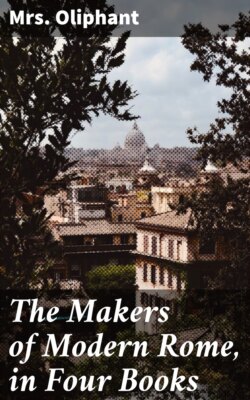Читать книгу The Makers of Modern Rome, in Four Books - Mrs. Oliphant - Страница 6
На сайте Литреса книга снята с продажи.
Оглавление"What are these men? To those who see them pass they are more like bridegrooms than priests. Some among them devote their life and energies to the single object of knowing the names, the houses, the habits, the disposition of all the ladies in Rome. I will sketch for you, dear Eustochium, in a few lines, the day's work of one of them, great in the arts of which I speak, that by means of the master you may the more easily recognise his disciples.
"Our hero rises with the sun: he regulates the order of his visits, studies the shortest ways, and arrives before he is wanted, almost before his friends are awake. If he perceives anything that strikes his fancy, a pretty piece of furniture or an elegant marble, he gazes at it, praises it, turns it over in his hands, and grieves that he has not one like it—thus extorting rather than obtaining the object of his desires; for what woman would not hesitate to offend the universal gossip of the town? Temperance, modesty (castitas), and fasting are his sworn enemies. He smells out a feast and loves savoury meats.
"Wherever one goes one is sure to meet him; he is always there before you. He knows all the news, proclaims it in an authoritative tone, and is better informed than any one else can be. The horses which carry him to the four quarters of Rome in pursuit of this honest task are the finest you can see anywhere; you would say he was the brother of that King of Thrace known in story by the speed of his coursers.
"This man," adds the implacable satirist in another letter, "was born in the deepest poverty, brought up under the thatch of a peasant's cottage, with scarcely enough of black bread and millet to satisfy the cravings of his appetite; yet now he is fastidious and hard to please, disdaining honey and the finest flour. An expert in the science of the table, he knows every kind of fish by name, and whence come the best oysters, and what district produces the birds of finest savour. He cares only for what is rare and unwholesome. In another kind of vice he is not less remarkable; his mania is to lie in wait for old men and women without children. He besieges their beds when they are ill, serves them in the most disgusting offices, more humble and servile than any nurse. When the doctor enters he trembles, asking with a faltering voice how the patient is, if there is any hope of saving him. If there is any hope, if the disease is cured, the priest disappears with regrets for his loss of time, cursing the wretched old man who insists on living to be as old as Methusalem."
The last accusation, which has been the reproach of the Church in many different ages, had just been specially condemned by a law of the Emperor Valentinian I., declaring null and void all legacies made to priests, a law which called forth Jerome's furious denunciation, not of itself, but of the abuse which called it forth. This was a graver matter than the onslaught upon the curled darlings of the priesthood, more like bridegrooms than priests, who carried the news from boudoir to boudoir, and laid their entertainers under contribution for the bibelots and ancient bric-a-brac which their hearts desired. Thus wherever the eye turned there was nothing but luxury and the love of luxury, foolish display, extravagance and emulation in all the arts of prodigality, a life without gravity, without serious occupation, with nothing in it to justify the existence of those human creatures standing between earth and heaven, and capable of so many better things. The revulsion, a revulsion inspired by disgust and not without extravagance in its new way, was sure to come.
THE PALATINE, FROM THE AVENTINE.
THE RIPETTA.
